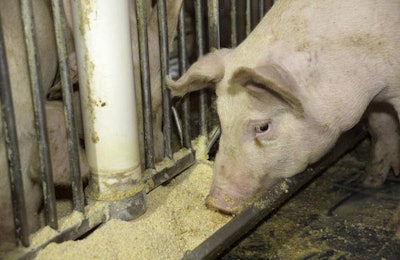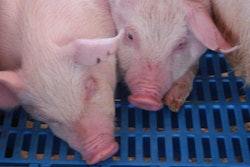
Authorities in Vietnam are ramping up measures to control the spread of African swine fever (ASF), which has already led to the loss of 5 percent of the country’s pig population, while the first case of the disease has been detected in Hong Kong.
The latest report from Vietnam’s agriculture ministry to the World Organisation for Animal Health (OIE) outlines more than 2,100 confirmed ASF cases in 29 cities and provinces covering the period March 7 through May 6.
More than 1.32 million animals were destroyed as the result of these outbreaks. An even greater concern is the confirmation that the infection has spread from the north of the country, and it now threatens the commercial pork sector in the south, with outbreak clusters confirmed in two provinces in the Southeast region, and one in the Mekong Delta region.
Last week, Deputy Prime Minister Trinh Dinh Dung announced that the agriculture ministry will be responsible for overseeing the slaughter of pigs in infected areas, reports Xinhua.
In addition, five quarantine stations are to be built across the country to facilitate animal transportation while controlling the disease, and the agriculture ministry was directed to support farmers whose animals have been lost to the disease.
With the aim to secure pork supplies for the rest of the year, the deputy prime minister called on the ministry of industry and trade to purchase and slaughter pigs for frozen storage. A ministry official commented to Vietnam News that freezing will further add to the cost of pork, and consumers much prefer fresh meat to frozen.
Not only does ASF now pose a threat to Vietnamese pork supplies, its spread has been rapid. The last report from the agriculture ministry to the OIE was at the end of March, when the number of confirmed outbreaks had reached 211, and 10,420 animals had been lost to the disease through mortality or culling.
The challenges faced by the authorities are exacerbated by the need to move large numbers of animals around the country to maintain pork supplies. Every day, some four thousand animals from the north of Vietnam are transported through the capital, Ho Chi Minh City, to the densely populated Mekong Delta in the south, according to Vietnam News. It reports that pigs are transported only along two highways, and that the animal transport vehicles are disinfected at two quarantine points on these routes.
Within a few days, the same source reported ASF outbreaks at large-scale pig farms with biosecurity in the north of Vietnam, as well as among the many farming households. One northerly province is paying affected households VND2,400-3,600 (US$1.02-1.54) per kilo in compensation when infected pigs have to be destroyed.
Based on the official OIE reports, and data from FAOstat, the statistics unit of the United Nations’ Food and Agriculture Organization, the loss of over 1.33 million pigs represents almost 5 percent of Vietnam’s pig population since the first confirmed ASF outbreak in February of this year.
First ASF outbreak in Hong Kong area of China
The ASF virus has been detected for the first time in the Hong Kong Special Administrative Region of China.
In early May, samples were taken from a group of “imported pigs” at a slaughterhouse in Hong Kong, and samples from one animal subsequently tested positive for the ASF virus. Operations have been suspended at the slaughterhouse in the New Territories since this information became available, according to the agriculture department’s report to the OIE.
Within days of the announcement, 6,000 pigs at the affected slaughterhouse were culled to facilitate thorough disinfection of the site, and transport of live pigs from the Chinese mainland to Hong Kong were halted, reported South China Morning Post. At least one other slaughterhouse in Hong Kong closed voluntarily, leaving pork in short supply and angering traders.
Both slaughterhouses are reported to be resuming operations imminently, according to the Hong Kong regional government.
ASF has also been detected in a batch of 75 pigs at a slaughterhouse in Guiyang city in Guizhou province. According to the China’s agriculture ministry, the virus was detected following the death of six of the animals. The owner is reported to have moved the animals into the province illegally. The facility has been closed, and all movements of pigs and their products in the area have been halted.
ASF outbreaks in South Africa, Ukraine
New outbreaks of ASF in domestic pigs have been confirmed to the OIE by the veterinary agencies of South Africa, and Ukraine.
South Africa’s total ASF outbreaks has risen to three with the news of an outbreak among a herd of 350 pigs in Free State on May 10. Around half of the animals died at the farm in Ngwathe district. As with the country’s previous outbreak s— in the provinces of Mpumalanga and Gauteng — the cases were discovered in areas outside the national ASF Control Zone.
The latest outbreak in Ukraine affected a backyard operation in the Kiev area, in which the only pig died.
More ASF reported in European wild boars
Based on reports of the respective animal health agencies to the OIE over the past week, Poland is the country reporting the most new ASF cases in wild boars — 87 animals at 58 locations in provinces in the east of the country where multiple previous cases have been confirmed.
There have also been further cases confirmed in wild boar in Hungary (49 animals), Belgium (18), Latvia (6), and Russia (1).
View our continuing coverage of the African swine fever outbreak.
















